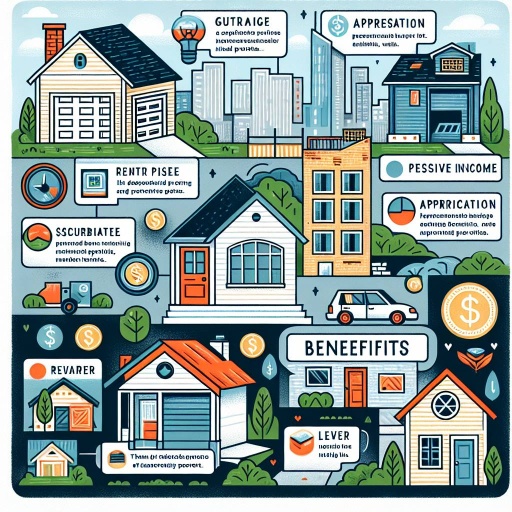Investing in rental properties has emerged as a powerful strategy for generating passive income. More than just a source of revenue, rental properties can foster community development, provide housing solutions, and serve as a significant wealth-building tool for individuals and families. In this blog post, let’s explore the myriad benefits that rental properties can offer to investors and society alike.

Benefits
Long-term Financial Stability
Owning rental properties can provide a consistent cash flow, leading to financial stability. Rental income serves as a reliable source of passive income that can help cover mortgage payments, maintenance costs, and property taxes. Over time, the appreciation of property value contributes to the overall wealth of landlords.
Wealth Building Through Property Appreciation
Real estate often appreciates over time, meaning that the value of rental properties can increase significantly. Investors can leverage this appreciation, potentially leading to lucrative returns when they decide to sell their properties. This is particularly beneficial in growing urban areas where demand for housing is on the rise.
Tax Advantages
Investing in rental properties comes with various tax benefits. Property owners can deduct mortgage interest, property taxes, and depreciation on their taxes, resulting in significant savings. These tax advantages can enhance overall profitability and provide investors with more capital to reinvest in their properties or new ventures.
Diverse Investment Portfolio
Real estate diversification in a financial portfolio can reduce risk. By investing in rental properties, individuals can balance their investments in stocks and bonds with tangible assets. This diversification often provides a cushion against market volatility.
Community Impact and Housing Solutions
Rental properties play a crucial role in providing housing solutions to communities. By offering well-maintained and affordable rental units, property owners contribute to the local housing market and offer stability to families. This, in turn, fosters community growth and cohesion.
Inflation Hedge
Real estate is considered a reliable hedge against inflation. As living costs rise, so do rental prices. Rental properties allow investors to adjust rent over time, ensuring that their income keeps pace with inflation, which safeguards their investment value.
Flexibility in Investment Strategies
Investors have various strategies when it comes to rental properties. They can choose long-term rentals, short-term vacation rentals, or commercial properties based on their investment goals. This flexibility allows them to tailor their investment to fit market trends and personal preferences.
Use Cases
A Family Achieving Financial Independence
Description: The Smith family invested in a duplex, living in one unit and renting out the other. This not only provided them with significant monthly rental income but also helped them pay off their mortgage faster. Their rental income eventually allowed them to transition into full-time entrepreneurship.
Impact: Their financial independence gave them the freedom to pursue business opportunities while providing a nurturing home environment.
Revitalizing a Neighborhood
Description: A local developer purchased multiple run-down properties in a struggling neighborhood, renovated them, and turned them into rental units. This project attracted new residents, increased local business revenue, and fostered community pride.
Impact: Revitalization efforts improved the quality of life for existing residents and contributed to a decrease in crime rates in the area.
Statistics
- In the United States, rental properties make up 37% of the housing market.: 37%
- Historically, real estate values have appreciated at an average rate of 3-4% per year over the last 50 years.: 3-4% per year
- 85% of property investors indicated rental properties as a primary source of passive income.: 85%
Potential Drawbacks
Initial Investment Costs
The upfront costs for purchasing rental properties can be substantial. In addition to the down payment, investors must consider closing costs, renovations, and maintenance.
Ongoing Management Responsibilities
Managing rental properties can require significant time and effort. From finding tenants to maintaining the property, landlords must be vigilant in ensuring their investment remains profitable.
Market Fluctuations
The real estate market can be unpredictable, and rental prices may decrease due to economic downturns, impacting cash flow and profitability.
Comparison With Alternatives
Compared to Stock Investments
While stocks offer liquidity and ease of trading, they often lack the tangible benefits of rental properties, such as providing housing solutions and control over asset management.
Compared to Savings Accounts
Savings accounts provide low interest, whereas rental income can yield higher returns over time, making real estate a more attractive investment option for those seeking passive income.
FAQs
What is the average return on investment for rental properties?
The average ROI for rental properties can range from 8% to 12%, depending on various factors like location, property management, and market conditions.
How do I find good rental properties?
Researching neighborhoods, analyzing market trends, and utilizing real estate agents specializing in investment properties can help identify good rental opportunities.
What are the risks involved with rental properties?
Common risks include vacancy rates, property damage, market fluctuations, and economic downturns that could affect tenant income.
Tips for maximizing benefits
Conduct Thorough Market Research
Stay informed about local rental markets to understand rental demand, price trends, and neighborhood developments.
Invest in Property Management
Utilizing professional property management can streamline operations, improve tenant relations, and maximize rental income.
Regular Maintenance and Upgrades
Keeping properties well-maintained and periodically upgrading amenities can enhance tenant satisfaction and reduce vacancy rates.
Conclusion
Investing in rental properties not only opens up pathways for financial freedom but also plays a significant role in community development and housing solutions. While potential drawbacks exist, the numerous benefits and opportunities that come with rental property investment make it a worthwhile consideration for anyone looking to build wealth and positively impact society. With the right strategies and management, rental properties can pave the way to a stable and prosperous future.

